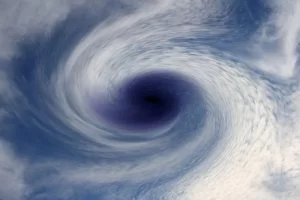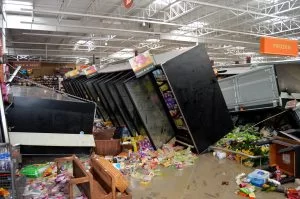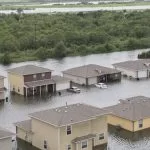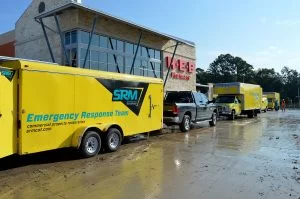Natural disasters have the capacity to wreak havoc within minutes. Public officials monitoring severe weather conditions alert the general public about the oncoming foul weather conditions. Weather advisories should be heeded with prompt appropriate action.
 Weather alerts are communicated in several ways. The Emergency Alert System is a national system designed to notify all Americans of natural threats via television or radio. NOAA Weather Radio All Hazards keeps radio audiences informed of weather watches, warnings, forecasts and hazardous information 24 hours a day, 7 days a week. Cell phones have the capability to receive weather alerts from media sources, like The Weather Channel. Text alerts and emails from the National Weather Service are also available to transmit emergency weather-related news. Loud sirens, though not as frequently used, may also inform the local community of impending storms, such as tornados. Apps from the American Red Cross and The Weather Channel push warnings to those who choose the alerts most applicable to their area.
Weather alerts are communicated in several ways. The Emergency Alert System is a national system designed to notify all Americans of natural threats via television or radio. NOAA Weather Radio All Hazards keeps radio audiences informed of weather watches, warnings, forecasts and hazardous information 24 hours a day, 7 days a week. Cell phones have the capability to receive weather alerts from media sources, like The Weather Channel. Text alerts and emails from the National Weather Service are also available to transmit emergency weather-related news. Loud sirens, though not as frequently used, may also inform the local community of impending storms, such as tornados. Apps from the American Red Cross and The Weather Channel push warnings to those who choose the alerts most applicable to their area.
Weather advisories and alerts are transmitted to the public from officials who work together to ensure people are aware of severe oncoming weather. The officials who send weather alerts through various technology include local police and fire personnel, private industries, the National Weather Service, the Federal Emergency Management Agency, The National Oceanic and Atmospheric Administration and the Federal Communications Commission.
Severe weather can take the form of powerful winds, tornadoes, hurricanes, thunderstorms and many other natural events. People are encouraged to become familiar with the various types of weather alerts that refer to conditions that are likely to occur in their vicinity. Common types of weather alerts include the following:
WINDS
High winds can topple trees and turn patio furniture into dangerous projectiles. When high winds are expected, bring anything not tied down into the home or secure them. Take shelter and stay up to date on advisories.
High wind warning: When sustained winds greater than 40 mph are inflicted upon an area for one hour or more, a high wind warning is issued. Warnings are also communicated when any duration of 58 mph winds blow through an area.
Wind advisory: Wind advisories are common. Alerts signal sustained winds of 31 to 39 mph that last at least an hour or longer. Wind gusts between 46 to 57 mph also call for a wind advisory.
Extreme wind warning: When winds are expected to reach 115 mph within the hour and are not associated with a tornado, extreme wind warnings are issued.
HURRICANES
 Those who receive alerts related to hurricanes should follow the officials’ instructions and evacuate if advised to do so.
Those who receive alerts related to hurricanes should follow the officials’ instructions and evacuate if advised to do so.
Hurricane watch: When tropical storms with 74 mph winds are possible, a hurricane watch is issued. River flooding, coastal flooding and storm surges accompany the powerful wind gusts.
Hurricane warning: Hurricane warning alerts are announced when 74 mph wind gusts associated with hurricanes are expected within 36 hours. Waters rise dangerously high and waves reach massive heights, causing coastal flooding and storm surges.
THUNDERSTORMS
Along with frequent lightning, thunderstorms can be accompanied by dangerous hail, destructive winds and the possibility of tornadoes. Avoid contact with electrical devices during a thunderstorm and stay indoors for at least 30 minutes after hearing the final boom of thunder.
Severe thunderstorm watch: The possibility of severe thunderstorms, defined by one-inch hail and/or wind gusts up to 58 mph in the area will prompt a severe thunderstorm watch.
Severe thunderstorm warning: When severe thunderstorms are imminent or are presently occurring in the area, severe thunderstorm warnings are sent.
TORNADOES
Take shelter in a sturdy building when tornadoes are close at hand. Basements, cellars or rooms on the lowest levels are ideal shelters in the wake of a tornado. Stay out of harm’s way by keeping away from windows, doors and exterior walls.
Tornado watch: Tornadoes that may possibly occur will spur a tornado watch alert.
Tornado warning: When tornadoes are imminent in the local area, the tornado warning will go off.
FLOODING
 Never attempt to walk or drive through floodwaters. Even six inches of floodwater will topple an adult and one foot of floodwater will float away a car. Take shelter on higher ground or evacuate if advised.
Never attempt to walk or drive through floodwaters. Even six inches of floodwater will topple an adult and one foot of floodwater will float away a car. Take shelter on higher ground or evacuate if advised.
Coastal flood watch: When flooding along the coast is likely, a coastal flood watch alert is issued.
Coastal flood warning: Major coastal flooding that is occurring or nearing is a serious threat to life and property. As a result, coastal flood warnings are issued.
Flash flood watch: When conditions are favorable for a flash flood, a flash flood watch is issued. These watches only suggest the possibility of a flash flood occurring.
Flash flood warning: When an actual flash flood is occurring or imminent, alerts are issued.
HEAT
Reschedule outdoor activities and hydrate frequently during intense heat.
Excessive heat warning: Temperatures that exceed 105 to 110 degrees Fahrenheit (depending on location) within 12 to 24 hours will warrant an excessive heat warning.
Heat advisory: Heat waves that span multiple days or soaring temperatures early in the season may call for a heat advisory. When the heat index spikes to 100 to 109 degrees Fahrenheit within 12 to 24 hours, a heat advisory will be issued.
Disaster Restoration
 When you receive weather alerts for tornados or hurricanes, damage to your property can possibly ensue. In the immediate aftermath of the destruction, contact the most trusted name in hurricane and tornado damage restoration, ServiceMaster Restoration & Cleaning.
When you receive weather alerts for tornados or hurricanes, damage to your property can possibly ensue. In the immediate aftermath of the destruction, contact the most trusted name in hurricane and tornado damage restoration, ServiceMaster Restoration & Cleaning.
Storm damage restoration services provided by ServiceMaster Restoration & Cleaning include debris removal, tarping, emergency board-up, and reconstruction. Hurricanes can unleash a tidal wave of water into the home, causing water damage. Our professionals at ServiceMaster Restoration & Cleaning are skilled in all facets of water damage restoration. Our experts will return your home to its pre-disaster condition quickly and we also work with your homeowner’s insurance.
ServiceMaster Restoration & Cleaning reliably serves the residential and business communities of Houston, TX. The team is available 24 hours a day to take emergency calls.

